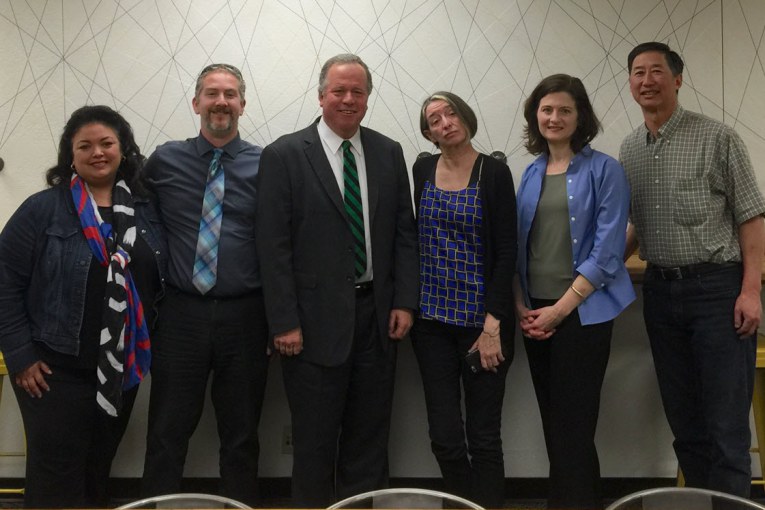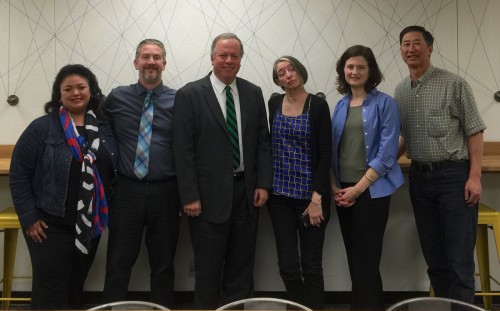

By Vanguard Editorial Board
On Thursday March 17, the Editorial Board for the Davis Vanguard met with Assemblyman Bill Dodd. The meeting sought to delve deeper into Dodd’s platform and allow him the chance to personally voice his views and explain proposed measures. He was given the opportunity to personally voice his views and explain proposed measures. The Davis Vanguard hopes this political Q&A will be the first of many interviews that will be extended to other politicians running for office, as a means of better informing the community about where candidates stand on important issues.
Dodd commenced the meeting by giving a ten-minute recap of his achievements and political endeavors thus far. Dodd, who served a 14-year stint on the Napa County Board of Supervisors before his 2014 election to State Assembly, is a former Republican who is now running under a Democratic platform. The Assemblyman disclosed that he co-authored the first resolution to secure Lake Berryessa Snow Mountain as a national monument, and also pushed a gender pay equity bill.
He described himself as a champion for education, environmental issues, poverty relief and sustainable agriculture, and noted that his major responsibility is being responsive to the communities he represents. His pending bills include a Transparent Water Data Act, which would centralize water resource and usage information, as well as a bill to protect seniors by requiring background checks for all referred caregivers. Lastly, Dodd commented on his desire to strengthen the architectural and foundational guidelines for schools and care facilities, which he worries is vulnerable to structural damage during natural disasters and earthquakes.
Assemblyman Dodd then opened up the floor for questions.
Noting that equal pay did not necessarily equate to equal opportunity in the workplace, Board member Will inquired about Dodd’s stance on blind auditions as a possible solution to unfair biases in job hiring. The Assemblyman responded with mixed feelings, stating that he was not necessarily in support of blind auditions but was open to exploring the concept more. His energy remained focused on gender equity in salary and measures that would prohibit employers from asking about previous salary earnings.
Turning the focus to retirement, Board member Sweha noted that although the State’s current unfunded retiree health liability is almost at $75 billion and growing rapidly, the governor’s proposed budget does not allocate any money toward this debt. She asked if Assemblyman Dodd thought the State should start to pay down this debt this year. Dodd responded that benefits were part of open negotiations, stating specifically, “We have lots of thing we want to do with what we see as $2-$3 billion dollars of excess money in the budget. That’s one of the things we need to look at and make a serious decision about. For example, road maintenance continues to be a problem that needs fixing. The State is stepping over dollars to pick up dimes here.”
Board member Sweha provided a follow up question about whether or not longer vesting periods were a good idea, which Dodd negated under the grounds that the age of retirement was the biggest factor and not necessarily the benefit vesting period ESO (Employee Stock Options) wait time. He did admit, however, that this may change over time.
Board Chairman Greenwald then moved the discussion to the broken family court structure, a system that many feel has ruled to enact less than ideal outcomes for foster children. Explicitly mentioned was the fear that there was no real mechanism in place to shield children from potentially damaging or predatory situations within the family, in addition to the court’s inability to discern unsubstantiated claims from founded abuse.
Greenwald also probed Dodd’s stance on the court’s leaning that blood relatives are always the best choice for children over foster parents. Dodd prefaced his response by declaring himself the proud father and grandfather whose wife has been a CASA (Court Appointed Special Advocates) volunteer for many years. He concurred with the sentiment that blood relatives are not always best, but admitted that hands are often tied in custodial rulings given the policies put in place by the federal government.
He brainstormed the possibility of having the judicial counsel craft specific guidelines as to what they deem ineffective within the realm of the foster care system. Dodd rejected the negative stereotype of the money-driven foster parent, and envisioned a mutual alliance which would contract foster parents to work with legislators at the federal level to help smooth out some of the systemic problems. This led to further discussion about the level of power the judicial council has in relation to the judges that oversee and ultimately rule on cases. Dodd held firm on his belief that collective guidance is a paramount factor in fixing the shortcomings of the family court.
Board member Fung asked Dodd about his thoughts on Lois Wolk’s recent introduction of the Aquifer Protection Act which would work to slow the depletion of aquifers, especially those aquifers in critical overdraft, to minimize permanent damage to the state’s groundwater resources. Assemblyman Dodd disclosed his utmost confidence in Lois Wolk’s knowledge of water law, specifically stating, “I’m not sure in this particular case that is it a one size fits all issue. I just want to make sure we’re not doing duplicative work and that each county is doing their job. I’m not sold on the idea that sticking new straws in the ground is the smartest thing to do. There needs to be some way to demonstrate that that there would be a decrease in water usage.” Dodd subsequently noted that the newly proposed bill was probably a step in the right direction, but that more latitude needed to be given to local governments in making sure they’re doing their job.
The meeting was then redirected to the proposed soda tax, with Board member Escamilla-Greenwald citing that 30-40 percent of children in Yolo County are at a heightened risk for diabetes. Dodd expressed that he is not a fan of taxation programs (with the exception of cigarette tax) and prefers county by county health educations programs. He views childhood obesity as a symptom of educational divestment, and felt health behaviors need to be understood holistically and not just relegated as the job of teachers to instill in children. Then Board member Will acknowledged that health education in schools is a late start.
Dodd countered: “It’s a double edge sword. I’m not there yet on the soda tax because I haven’t seen the evidence that shows that tax programs work as a deterrent instead of just being a source of revenue. I am a firm believer that public health knows no boundaries. That’s why I voted for funding undocumented children. But I am of the belief that things work better when it comes locally, close to the community and by locally elected officials.”
On the topic of cap and trade, which was raised by Board member Sweha, Assemblyman Dodd was asked whether or not he felt that earmarked funds were appropriately used and how the remaining $40 million should be prioritized. Dodd divulged that he would be supportive of cap and trade as a progressive method to lower carbon emissions, but feels more needs to done in determining the nexus of how and where money is spent.
Upon subsequent prompting from Board Member Sweha about CEQA overhaul, Dodd noted that he is not sure whether a revamping of the California Environmental Quality Act is a political possibility, and feels that a refocus on non-environmentally degradative business growth is needed. Dodd expressed his disinterest in streamlining enterprise if it comes at the expense of clean air, environmental health and species habitat. CEQA reform, he notes, must therefore find harmony with the housing industry and not be at odds with it, so that reformulation helps ease the offset costs that raise the price of the much needed affordable units without disregarding the environment.
Board Member Escamilla-Greenwald requested clarity on Dodd’s views regarding impacted courses which are slowing the graduation rates for undergraduate students at the Associate and Bachelor level. Dodd voiced his support for super funding community college, which he regarded as the foundation for a strong workforce. In addition, he noted that he is in complete support of universal preschool, stating that “we need to quit talking about it and find a way to pay for it. If you look at what these funds have been going to, we’re in the top five for prison spending and lagging on our education, which we need to be prioritizing. Education spending will pay for itself through a decrease of imprisonment.” He pushed for the adoption of four-year degree programs at local community colleges.
The discussion ended with Board member Will inquiring about the Assemblyman’s position on gun control, specifically whether Dodd would stand behind ammunition control or stronger regulation if research finds it directly correlates to a decrease in violent crimes. Dodd, a gun owner and hunter, showed doubt in placing burdens on gun restriction (alluding that strong gun laws haven’t thwarted crimes thus far) but admitted that he would ultimately stand behind research if it indicated that said measures would contribute to prevention. He is against gun access for the mentally unstable, or those with a violent history.
Dodd also volunteered that he supports an increase in the minimum wage to $15, but does not stand behind the high speed rail measure. Dodd remained neutral on the position of Chancellor Katehi’s resignation, stating that more transparency among administration is needed in the future.